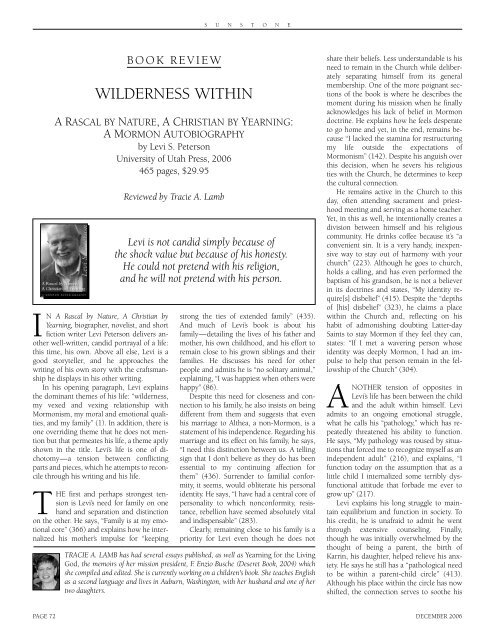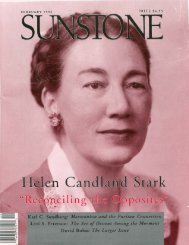Download Entire Issue PDF - Sunstone Magazine
Download Entire Issue PDF - Sunstone Magazine
Download Entire Issue PDF - Sunstone Magazine
You also want an ePaper? Increase the reach of your titles
YUMPU automatically turns print PDFs into web optimized ePapers that Google loves.
S U N S T O N E<br />
IN A Rascal by Nature, A Christian by<br />
Yearning, biographer, novelist, and short<br />
fiction writer Levi Peterson delivers another<br />
well-written, candid portrayal of a life:<br />
this time, his own. Above all else, Levi is a<br />
good storyteller, and he approaches the<br />
writing of his own story with the craftsmanship<br />
he displays in his other writing.<br />
In his opening paragraph, Levi explains<br />
the dominant themes of his life: “wilderness,<br />
my vexed and vexing relationship with<br />
Mormonism, my moral and emotional qualities,<br />
and my family” (1). In addition, there is<br />
one overriding theme that he does not mention<br />
but that permeates his life, a theme aptly<br />
shown in the title. Levi’s life is one of dichotomy—a<br />
tension between conflicting<br />
parts and pieces, which he attempts to reconcile<br />
through his writing and his life.<br />
THE first and perhaps strongest tension<br />
is Levi’s need for family on one<br />
hand and separation and distinction<br />
on the other. He says, “Family is at my emotional<br />
core” (366) and explains how he internalized<br />
his mother’s impulse for “keeping<br />
BOOK REVIEW<br />
WILDERNESS WITHIN<br />
A RASCAL BY NATURE, A CHRISTIAN BY YEARNING:<br />
A MORMON AUTOBIOGRAPHY<br />
by Levi S. Peterson<br />
University of Utah Press, 2006<br />
465 pages, $29.95<br />
Reviewed by Tracie A. Lamb<br />
Levi is not candid simply because of<br />
the shock value but because of his honesty.<br />
He could not pretend with his religion,<br />
and he will not pretend with his person.<br />
strong the ties of extended family” (435).<br />
And much of Levi’s book is about his<br />
family—detailing the lives of his father and<br />
mother, his own childhood, and his effort to<br />
remain close to his grown siblings and their<br />
families. He discusses his need for other<br />
people and admits he is “no solitary animal,”<br />
explaining, “I was happiest when others were<br />
happy” (86).<br />
Despite this need for closeness and connection<br />
to his family, he also insists on being<br />
different from them and suggests that even<br />
his marriage to Althea, a non-Mormon, is a<br />
statement of his independence. Regarding his<br />
marriage and its effect on his family, he says,<br />
“I need this distinction between us. A telling<br />
sign that I don’t believe as they do has been<br />
essential to my continuing affection for<br />
them” (436). Surrender to familial conformity,<br />
it seems, would obliterate his personal<br />
identity. He says, “I have had a central core of<br />
personality to which nonconformity, resistance,<br />
rebellion have seemed absolutely vital<br />
and indispensable” (283).<br />
Clearly, remaining close to his family is a<br />
priority for Levi even though he does not<br />
TRACIE A. LAMB has had several essays published, as well as Yearning for the Living<br />
God, the memoirs of her mission president, F. Enzio Busche (Deseret Book, 2004) which<br />
she compiled and edited. She is currently working on a children's book. She teaches English<br />
as a second language and lives in Auburn, Washington, with her husband and one of her<br />
two daughters.<br />
share their beliefs. Less understandable is his<br />
need to remain in the Church while deliberately<br />
separating himself from its general<br />
membership. One of the more poignant sections<br />
of the book is where he describes the<br />
moment during his mission when he finally<br />
acknowledges his lack of belief in Mormon<br />
doctrine. He explains how he feels desperate<br />
to go home and yet, in the end, remains because<br />
“I lacked the stamina for restructuring<br />
my life outside the expectations of<br />
Mormonism” (142). Despite his anguish over<br />
this decision, when he severs his religious<br />
ties with the Church, he determines to keep<br />
the cultural connection.<br />
He remains active in the Church to this<br />
day, often attending sacrament and priesthood<br />
meeting and serving as a home teacher.<br />
Yet, in this as well, he intentionally creates a<br />
division between himself and his religious<br />
community. He drinks coffee because it’s “a<br />
convenient sin. It is a very handy, inexpensive<br />
way to stay out of harmony with your<br />
church” (223). Although he goes to church,<br />
holds a calling, and has even performed the<br />
baptism of his grandson, he is not a believer<br />
in its doctrines and states, “My identity require[s]<br />
disbelief” (415). Despite the “depths<br />
of [his] disbelief” (323), he claims a place<br />
within the Church and, reflecting on his<br />
habit of admonishing doubting Latter-day<br />
Saints to stay Mormon if they feel they can,<br />
states: “If I met a wavering person whose<br />
identity was deeply Mormon, I had an impulse<br />
to help that person remain in the fellowship<br />
of the Church” (304).<br />
ANOTHER tension of opposites in<br />
Levi’s life has been between the child<br />
and the adult within himself. Levi<br />
admits to an ongoing emotional struggle,<br />
what he calls his “pathology,” which has repeatedly<br />
threatened his ability to function.<br />
He says, “My pathology was roused by situations<br />
that forced me to recognize myself as an<br />
independent adult” (216), and explains, “I<br />
function today on the assumption that as a<br />
little child I internalized some terribly dysfunctional<br />
attitude that forbade me ever to<br />
grow up” (217).<br />
Levi explains his long struggle to maintain<br />
equilibrium and function in society. To<br />
his credit, he is unafraid to admit he went<br />
through extensive counseling. Finally,<br />
though he was initially overwhelmed by the<br />
thought of being a parent, the birth of<br />
Karrin, his daughter, helped relieve his anxiety.<br />
He says he still has a “pathological need<br />
to be within a parent-child circle” (413).<br />
Although his place within the circle has now<br />
shifted, the connection serves to soothe his<br />
PAGE 72 DECEMBER 2006

















